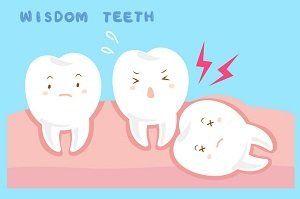When Should Wisdom Teeth Be Removed?
- By Mary Marks
- •
- 23 Jan, 2020
- •

In general, wisdom teeth erupt between the age of 17 and 25 years, although sometimes they appear much later in life. When they stay for a long time under the gum, they are more likely to cause you problems when they erupt. There are cases when the extraction of wisdom teeth is recommended, even if the patient has no pain or other symptoms. In other situations, these molars can be kept and treated.
Cases where dental surgery is absolutely necessary:
· In the case of gum infection surrounding the wisdom tooth: debris accumulates between the gum and the tooth, at which point the inflammation occurs, typically followed by a painful infection. In this case, the oral sedation dentistry Highlands Ranch specialist will extract the tooth so that the condition does not get worse.
· When tooth decay occurs: the specialist in dental surgery may recommend tooth extraction when decay occurs, because wisdom teeth are very difficult to treat, primarily because of their position.
· When the wisdom teeth affect the neighboring teeth, transmitting caries and periodontal disease
· For orthodontic reasons: extraction is recommended when these molars prevent proper orthodontic treatment.
Preventive removal of wisdom teeth is a complex topic in the
medical world, so the patient gets to wonder whether it is actually okay or not
to remove them. Unfortunately, the answer to this question is not a simple one.
The medical decision depends on how these teeth have erupted and the existence
of complications.
A simple x-ray can help the dentist figure out if wisdom teeth will erupt properly.





Although oral sedation dentistry Highlands Ranch is one of the optionsavailable for managing anxiety and discomfort during oral surgery, you certainly do not need to use it all the time. As a matter of fact, the exact type of sedation or anesthesia that you receive during oral procedures may depend on various factors, such as the complexity of the procedure, your medical problems, as well as your doctor’s preferences.
There can be several different levels of sedation that can be used in oral surgery. Local anesthesia is one of them. This involves injecting anesthetic medication into the specific area where the surgery will take place. It numbs the area and is often used for less invasive procedures.
Oral sedation involves taking medication in the form of a pill to induce a state of relaxation and drowsiness. The patient is still conscious, but he/she may not be fully aware of the procedure. At any rate, sedation helps him/her get rid of anxiety.
In the case of intravenous sedation, medication is administered through a vein, which induces a deeper state of sedation than oral sedation. Patients may still be conscious, but they are less aware of their surroundings and may not remember the procedure.





